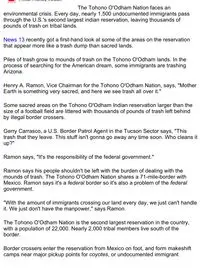
Migrants Trash Indian Res PDF
Preview Migrants Trash Indian Res
The Tohono O'Odham Nation faces an environmental crisis. Every day, nearly 1,500 undocumented immigrants pass through the U.S.'s second largest indian reservation, leaving thousands of pounds of trash on tribal lands. News 13 recently got a first-hand look at some of the areas on the reservation that appear more like a trash dump than sacred lands. Piles of trash grow to mounds of trash on the Tohono O'Odham lands. In the process of searching for the American dream, some immigrants are trashing Arizona. Henry A. Ramon, Vice Chairman for the Tohono O'Odham Nation, says, "Mother Earth is something very sacred, and here we see trash all over it." Some sacred areas on the Tohono O'Odham Indian reservation larger than the size of a football field are littered with thousands of pounds of trash left behind by illegal border crossers. Gerry Carrasco, a U.S. Border Patrol Agent in the Tucson Sector says, "This trash that they leave. This stuff isn't gonna go away any time soon. Who cleans it up?" Ramon says, "It's the responsibility of the federal government." Ramon says his people shouldn't be left with the burden of dealing with the mounds of trash. The Tohono O'Odham Nation shares a 71-mile-border with Mexico. Ramon says it's a federal border so it's also a problem of the federal government. "With the amount of immigrants crossing our land every day, we just can't handle it. We just don't have the manpower," says Ramon. The Tohono O'Odham Nation is the second largest reservation in the country, with a population of 22,000. Nearly 2,000 tribal members live south of the border. Border crossers enter the reservation from Mexico on foot, and form makeshift camps near major pickup points for coyotes, or undocumented immigrant Printer Friendly Version smugglers. Carrasco adds, "They get to here (a spot about 30 miles north of the Sonora/Arizona border), and basically from here is where they're gonna load up. So, they don't need the extra clothes and water jugs. They leave trash here, because there's no where to put it as they get loaded up." Ramon says, "It's a sore eye to go down the road and see all this trash." Tohono O'Odham officials estimate each undocumented immigrant leaves behind more than 8 pounds of litter. With nearly 1,500 crossing tribal lands every day, that amounts to 13,000 thousand pounds a day, and almost 5 million pounds a year. Tribal leaders are asking the federal, state and county governments to get involved. However, Ramon says it's an uphill battle. "We do try to clean what we can, but, still we're overwhelmed," says Ramon. If there's no solution soon, Ramon fears the "Mother Earth" that he and other tribal leaders worked so hard to preserve for future generations could all be thrown away. O'Odham officials say, at this time, they still haven't received any indication that the federal, state and county government will help economically, or by providing manpower to clean the trash up. Thousands of O'Odham tribal members also live in Mexico on native lands south of the border. Mexican officials say those areas are also being trashed by border crossers. Top Local Stories on News 13 More >> Petty Crime Increases At Chrismastime Red Cross Blood Drive Salvation Army's Annual Thanksgiving Meal Five-Year-Old Girl Hit by Car Fire Kills Two in Sun City Former Arizona Pilot Goes Back to Court President Opens More Roads To Mexican Trucks Border Patrol Nabs Multiple Sexual Assault Suspect Frying Turkeys Safely All content © Copyright 2000 - 2002, WorldNow and KOLD, a Raycom Media station. All Rights R For more information on this site, please read our Privacy Policy and Terms of Service.
